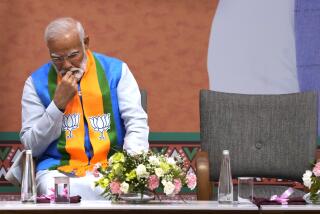State Elections ‘Shattering’ for Ruling Party in India : Politics: Results are called a ‘bloodless coup.’ Vote may be a warning for poorly received economic reforms.
- Share via
NEW DELHI — In an electoral earthquake that could force hasty corrections in India’s economic reforms, the ruling Congress (I) Party has been humiliated in state elections, with the most crushing defeat coming in Prime Minister P.V. Narasimha Rao’s own state.
“Simply shattering. We never expected this,” was the shocked reaction of Commerce Minister Pranab Mukherjee.
After two days of tallying, official returns showed that Congress had lost control of three of the four states where elections for the state assemblies and governments had taken place: Andhra Pradesh, Karnataka and Sikkim.
In the fourth state, Goa, Congress was deadlocked with an opposition coalition that included the Hindu nationalist Bharatiya Janata Party. But even if Congress wins all the remaining seats, it would fall short of retaining its hold on India’s smallest state.
Congress incumbents were victims of a “bloodless coup,” said a delighted Gali Muddukrishnam Naidu of the Telugu Desam Party, which chalked up a landslide victory in the southern state of Andhra Pradesh. Voters there turned out Rao’s party after five years because “it did not do anything for them,” Naidu claimed.
The disastrous showing by Congress does not affect its grip on the federal Parliament and government in New Delhi or its ability to make national policy.
But it is a mighty blow to Rao’s prestige and seems certain to revive leadership feuds inside Congress, along with doubts that the decidedly non-charismatic, plodding prime minister can survive until the next national election in 1996.
“He is the worst prime minister for the Congress,” said Ram Vilas Paswan of the left-leaning Janata Dal Party, which heavily outscored Rao’s party in Karnataka.
The Telugu Desam’s stunning victory, which gave it a big majority in Andhra Pradesh’s legislature, was the most troubling for Congress, because it is the state where Rao was born 73 years ago, where he has his personal power base and where he stumped for Congress candidates.
Rao’s party was humiliated by a former film star turned populist, Nandamuri Taraka Rama Rao, who promised voters government-subsidized rice at 3 cents a pound.
In neighboring Karanataka, economics was also one of the issues before voters.
As an antidote to the new, market-oriented approach of Congress, which began dismantling bureaucratic controls over the economy in 1991, Janata Dal promised people inexpensive kerosene and rice and government-funded jobs for 70,000 young people. Congress, in control of the state since 1989, lost heavily.
Some observers said the appalling showing by Congress showed that Rao and his leadership have become painfully vulnerable on the economic reform issue.
Rao himself had been at pains to prevent the election from being seen as a referendum on his policies and leadership, but he did act as Congress’ top campaigner in the south.
“Do you want to wear only an angavastram (Hindu sacred thread) and carry a begging bowl?” he had asked one crowd in Andhra Pradesh. “Or do you want to be part of the economic progress sweeping the country?”
Election results indicated that subsidized rice was a far more effective vote-getter than abstract talk about economic opportunity.
“Long before India is a country of Hindus, Muslims or castes, it is a country of poor people,” said M.J. Akbar, editor-in-chief of the Asian Age daily. “That’s the central fact of Indian life. For the past few years, we’ve had economic policies meant for the 200-million-member middle class. You can’t ignore the 700 million others, the poor people. For the first time, in these elections, they’ve had their chance to speak.”
Akbar, who is one of India’s most respected journalists and a former member of Parliament, predicted that Rao and his ministers will now likely shift their policies “from a Conservative approach, on the British scale, to a Laborite one.”
More to Read
Sign up for Essential California
The most important California stories and recommendations in your inbox every morning.
You may occasionally receive promotional content from the Los Angeles Times.













